At Caravan Guard, we insure thousands of adventurous motorhomers — including those who love to explore off-grid and take the road less travelled. So we teamed up with Tash and Jon from Life Beyond Bricks to bring you real-world tips for going off-grid in a motorhome.
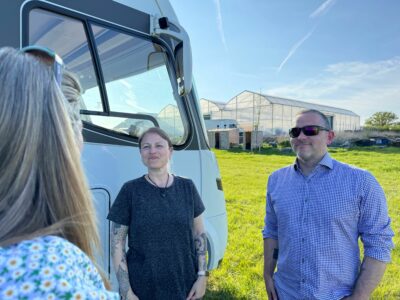
Owning a motorhome definitely gives you the freedom to explore, and with all the facilities on board, you can easily disconnect from the grid and head to a rural location away from the crowds, and maybe save a bit of money along the way.
This video is packed with experience-backed advice for safe, stress-free travel. Here are their top tips for going off-grid in a motorhome, from essential planning advice to managing power, water and waste:
Understanding what “off-grid” really means
Going off-grid in your motorhome doesn’t mean going off-road — it means staying somewhere without electric hook-ups or full campsite facilities. This could be allocated motorhome parking at a forest edge, a farmstay, pub car park, by the side of a canal or small certificated sites. It’s about being self-sufficient, on your own schedule and finding some hidden gems along the way.
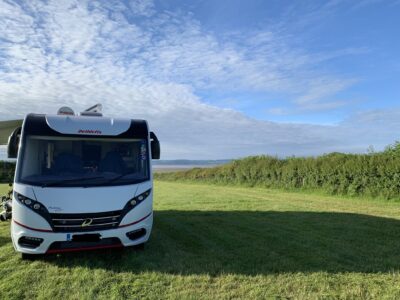
As Tash explains: “It’s about being able to unplug from services… it’s the freedom to explore places and being able to go to some really nice nature and beauty spots.”
Planning your off grid motorhome adventures
Off-grid success starts with a bit of planning. Jon and Tash stress that preparation makes all the difference, especially when you’re away from traditional campsite infrastructure.
- Check things like access roads, height barriers and how level the site is
- Check how long your power and water setup can realistically last
- Research stopovers that allow off-grid parking
- Note where you can refill fresh water and empty your waste
- Always have a backup option in case a location doesn’t work out
Apps like Park4Night, Britstops and Searchforsites can help you map out your route and find off-grid-friendly spots along the way.
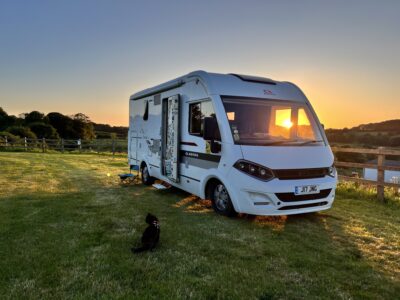
Off-grid power management
Power management is essential when you’re motorhome is not hooked up. Jon and Tash recommend:
- High-quality leisure batteries (preferably lithium for longevity)
- Solar panels for top-up charging
- Portable power banks
- Monitoring your energy usage
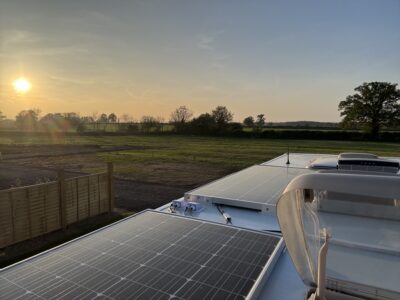
“Our motorhome has quite a unique setup,” said Jon. “We’ve got 360 watts of solar, lithium batteries, and inverters. This means we can use all of the 230-volt appliances, like the coffee machine and air fryer.”
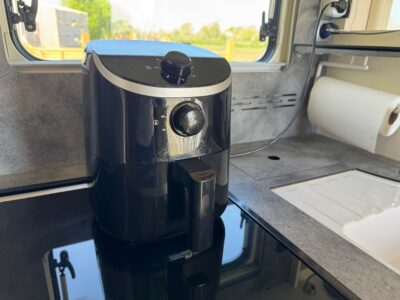
They also have a diesel blown-air heater to give them dual-fuel capability alongside refillable gas cylinders.
Managing water and waste
Off-grid motorhome stays involve a bit of extra planning regarding managing water and waste. Jon and Tash suggest:
- Carrying portable water containers and topping up when you can
- Knowing your nearest waste disposal point
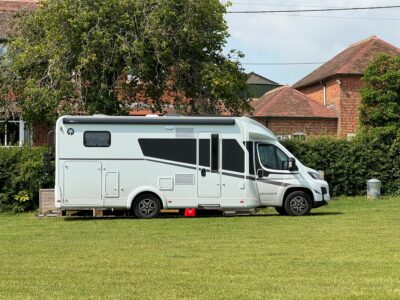
- Prolong your toilet cassette by using public toilets, bagging toilet tissue and carrying a spare toilet cassette
- Conserve water by only using what you need
- Cook one pot meals to save on washing up
- Use green toilet cassette chemicals
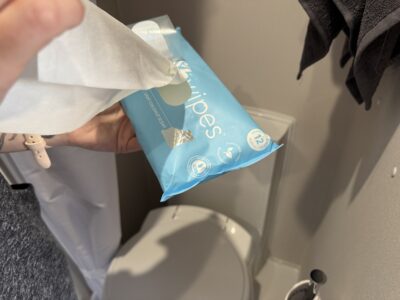
“It may sound silly, but things like don’t keep the tap running while you’re brushing your teeth,” said Tash. “If you’re short on water or run out, we use shower wipes. Or you can just wash in the sink, do it the old fashioned way!”
Keeping warm in your motorhome without hook up
Staying warm when motorhoming off-grid requires a bit of strategy, especially in the cooler months. Jon and Tash recommend:
- Using your motorhome’s gas heating system efficiently by turning it down a few degrees
- Carrying spare gas bottles or checking levels before long stays
- Adding thermal screens and insulated blinds to retain heat
- Using hot water bottles or extra blankets to save on fuel as well as packing extra clothes, blankets and sleeping bags
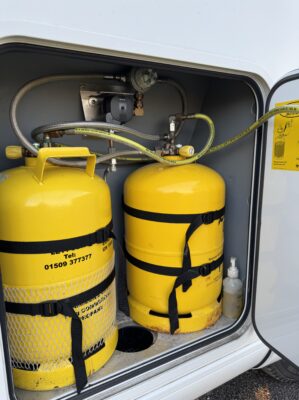
Recommended off-grid motorhoming kit
If you’re serious about going off-grid in your motorhome, here are some items that Tash and Jon would recommend:
- A solar panel – Crucial for recharging your leisure battery without hook-up
- Extra blankets and slippers – Particularly if you don’t like the cold
- Power bank – From small ones to charge up your mobile phone to larger power banks that will run three-pin plug devices
- Head torch – for areas that aren’t well lit or going to the toilet block at night
- Camping lanterns – to use inside or outside your motorhome, to conserve energy by not using your internal van lights
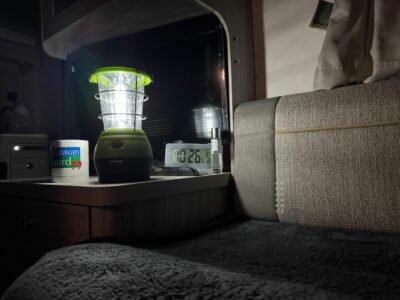
- 12-volt appliances – Check appliances like the vacuum cleaner have a 12-volt adapter to charge it
- Motorhome levelling ramps and chocks – as many off-grid sites won’t be level. And check that you can use them
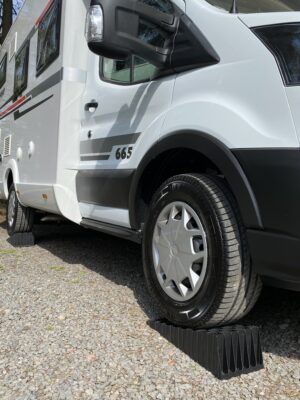
- Portable gas stove – Great as a backup or for an emergency cup of tea or outdoor cooking
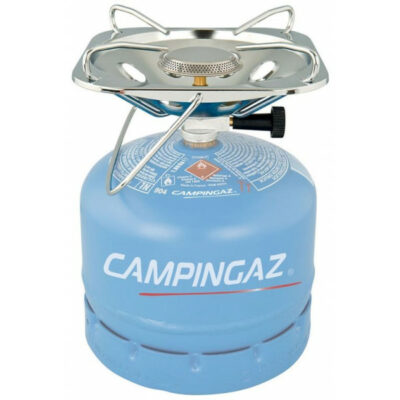
- Shower wipes – For personal hygiene when conserving water
- Insect repellent – for when you’re spending a lot of time outdoors
Safety and security
Peaceful spots often mean fewer people, so keeping your motorhome secure is essential. And the right insurance brings added peace of mind.
Use extra door locks, signage about CCTV or having a dog on board, and if the location doesn’t feel safe as Tash says: “If your gut says no, go!”.
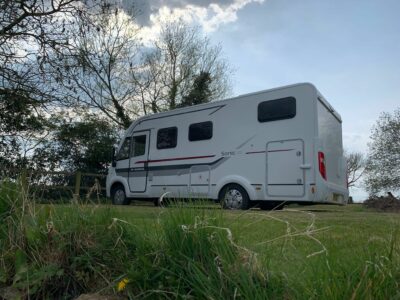
Caravan Guard’s motorhome insurance offers:
-
Comprehensive and specialist motorhome cover for off-grid stays
-
Theft, fire, and accidental damage — even away from traditional campsites
-
Up to £5,000 of cover for your motorhome equipment, including solar panels, power banks, and more.
Start small in your off-grid journey
You don’t need to jump in at the deep end. Jon and Tash recommend trying short off-grid motorhome trips first to get a feel for it – and stay close to home. This will give you an idea of how much power you typically use and to see how long your battery and gas is typically going to last.
“The more you do it, the easier it becomes — and the more you want to do it,” added Tash.
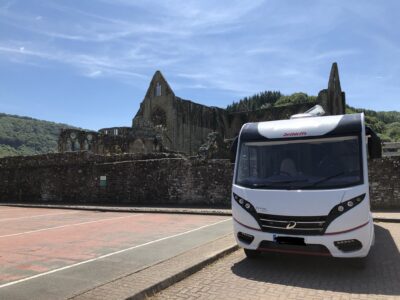
Is your motorhome insurance off-grid ready?
Caravan Guard’s specialist motorhome insurance policy is designed with freedom in mind — ideal for off grid explorers. Plus our UK breakdown cover will provide recovery for things like being stuck in the mud.
All insurance policy benefits are subject to terms, conditions and underwriting criteria. See our motorhome insurance page for more information.


Thanks for all the tips love Reading tham .keep up the good work
Thanks Les ☺️
An interesting watch with lots of good tips. We enjoy going off grid and the numerous apps available have made it much easier, although its always good to find new places not publicised. Our motto is ‘if its free, only stay one night, move on and leave it for others’. If your paying ‘stay as long as you need or allowed’.
Thanks David and for sharing your motto! ☺️
A lot of good advice. I go “off grid” for music festivals, where I have been a volunteer steward for over 20 years. Planning is Prime. Failing to Prepare is Preparing to Fail.
common sense and good advice
Good advice, but I would add Car rallies, Steam rallies and motorsport events and other shows as often “off Grid”
Good
Yes, very useful as I have just bought a Motorhome (first timer) I have solar panels and lithium batteries. But still learning. Your article is a useful confidence booster.
Thanks for the great feedback Des and good luck with your off grid adventures